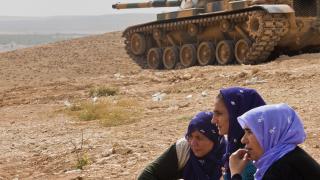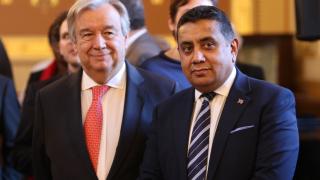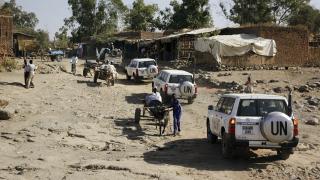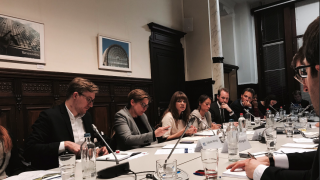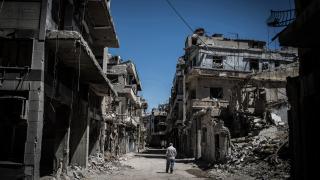
In the aftermath of the limited military strikes carried out by the US, UK and France in response to the alleged further use of chemical weapons by the Assad regime, UNA-UK calls for the UK and its allies to:
- Prioritise finding a negotiated end to the conflict in Syria – the best route to protect civilians – ahead of other considerations regarding the eventual shape of a political settlement in Syria and the manner in which the conflict was fought
- Reconsider the practice of issuing public ‘red lines’ with respect to selective provisions of international law, and to their military engagement in the conflict
- Support negotiations involving all parties to the conflict
- Drop preconditions for such negotiations
Prior to the recent strikes, UNA-UK warned that any such action should be taken with due consideration to the broader context – of the conflict and of the need to uphold international law. Now that the strikes have taken place, Western states, particularly those that conducted them, must intensify their efforts to make progress towards a diplomatic solution.
UNA-UK believes that bringing a negotiated end to the conflict in Syria represents one of the biggest challenges currently facing international diplomacy. It is also emblematic of cases that the Security Council typically struggles with – characterised by disagreement among the Council’s permanent members and by widespread abuses of international law, including mass atrocities. As such, it represents a fundamental threat to the legitimacy of the rules-based global system, of which the Council is a crucial part. The clear moral case for the UK pursuing such an outcome is therefore joined by the need for the UK to safeguard this system, and its privileged role within it, for reasons of national and global interest.
Options for bringing the conflict to an end have not been exhausted, and the current impasse does not need to be permanent. Parties to the conflict need to understand that there is no option for ending the conflict through military means alone. However, revitalising efforts to bring the fighting to a halt – particularly when the Assad regime appears to believe it has little to lose from standing its ground – will require a different approach and different priorities. UNA-UK has consulted its network of experts and practitioners to produce suggestions for action.
Support for the United Nations’ role in Syria
The UK and other Western states should provide vigorous support for relaunching the UN facilitated peace process, with the participation of those involved in the Astana talks sponsored by Russia, Turkey and Iran. UN Special Envoy Staffan de Mistura has already conducted consultations on options for progress, and the Secretary-General has offered his good offices. Meanwhile Sweden has demonstrated its ability as a convener of the “E10” elected members of the Security Council and the power that the E10 can exercise when they act in unison.
A successful approach would likely need to be agreed in the first instance between the E10 and Russia, with the Secretary-General (or his Envoy) acting as mediator, and the Geneva talks providing the framework for negotiations and the mechanism – ideally expanded – for Syrians themselves from all sides of the conflict to have their voices heard. Iran, Turkey, Iraq and Saudi Arabia could then be brought into discussions, as should a wide range of regional actors.
For its part, the UK must be aware that its prolonged absence from attempts to find common ground, followed by military action against the Syrian regime, mean that it may not be possible or advisable for it to take a lead role in negotiations. However, the UK could usefully apply pressure on its allies to support such a process and could also offer support, political and financial, for the gargantuan task of rebuilding Syria. This is a task which the United Nations will almost certainly be required to lead and oversee, much as it currently coordinates the humanitarian response in Syria.
While negotiations of this kind are likely the only viable method for bringing the conflict to an end, the principle of accountability for atrocity crimes must not be abandoned either. Evidence must be gathered, and no amnesties should be offered or expected. While accountability processes are likely to remain stalled at the Security Council, the UK should investigate other ways of advancing the agenda. One option worth exploring is the “Uniting for Peace” resolution, which was adopted in 1950 as a route for General Assembly action when the permanent members of the Security Council are in disagreement. Another is creative use of universal jurisdiction.
A new approach and priorities
Prioritising an end to the conflict
The UK should prioritise finding a negotiated end to the conflict in Syria – the best route to protect civilians – ahead of other considerations regarding the eventual shape of the political settlement in Syria and the manner in which the conflict was fought.
It is highly improbable that the Syrian civil war will be allowed to end in a manner which is not satisfactory to the major regional powers with a stake in that conflict. Many of these stakeholders have been complicit in perpetrating atrocities against the civilian population, and have displayed a callous indifference to their fate. But this does not mean that these powers will in every circumstance be opposed to a negotiated end to the conflict which protects civilians from further harm.
Distasteful as it may be to allow them to have a say in Syria’s future, it is surely more distasteful to allow the wholesale slaughter of Syrian civilians to continue. Given that other stakeholders have limited diplomatic leverage and political capital, it is unlikely that they will be in a position to dictate terms.
The UK could investigate the possibility of offering parties to the conflict concessions on other agendas of importance to them, in exchange for concessions which would help bring the suffering to an end in Syria. Diplomacy is a process of prioritisation and compromise. Civilian lives in Syria should be the priority, so compromises must be found to facilitate that goal.
Reconsidering red lines
Western states have rightly made clear that the use of chemical weapons violates longstanding international laws and norms and cannot be tolerated. They have also repeatedly asserted that military action, other than a limited response to chemical weapons, will focus on fighting ISIL and other such groups.
However, the international community has a responsibility to protect Syrians from both chemical and conventional threats, and from all parties to the conflict. It has a responsibility to take action in the face of atrocity crimes, which are also the subject of longstanding international laws and norms. The UK and other Western states should therefore reconsider the practice of issuing public ‘red lines’ with respect to selective provisions of international law, and to military engagement.
Involving all parties
The UK should signal support for inclusive UN-facilitated talks. UNA-UK reiterates its view that negotiations need to involve all stakeholders if they are to bear fruit, and urge the UK to reconsider their reluctance to countenance the involvement in negotiations of regional players such as Iran.
Dropping preconditions
The UK could also signal that it is willing to drop all preconditions for negotiations. Previous peace talks have failed, in part, because of the UK and US’s insistence on President Assad’s ouster. As UNA-UK has consistently argued, it is a mistake to insist that the desired end-point of negotiations is agreed before negotiations can even start.
Respecting our global system
To date, the Security Council’s permanent members have failed Syria, fuelling calls for the Council to be bypassed. Given the severity of the situation, UNA-UK too has offered suggestions on how such an approach could be taken forward in a manner that seeks to balance action with respect for international law and process.
But this is a dangerous path. Despites its many failures the Council remains a crucial part of the rules-based international system on which we all depend, as the body mandated by UN member states to authorise the use of force and to maintain international peace and security. Its credibility is already undermined by its composition, which does not reflect our increasingly multipolar world.
The UK and other permanent members must recognise that every failure strikes a further blow, not only to their legitimacy but that of the Council as a whole. Equally, if those states that have the biggest stake in preserving the Council in its current form – the five permanent members – repeatedly disregard its authority, then the Council, and the UN system more broadly, may go the way of the League of Nations.
Seven long years of suffering for the people of Syria should be enough to motivate renewed diplomatic efforts. But if states need further encouragement, they must realise there is far more at stake here.
Photo credit: Chaoyue Pan/CC



